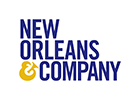With existing electric vehicle (EV) charging infrastructure in place and working toward energy efficiency investments defined in their new Strategic Master Plan, the Port of New Orleans (Port NOLA) expanded their EV fleet with the help of the Clean Fuel Transition Fund for Public Fleets, managed by the Regional Planning Commission’s (RPC) Clean Fuel Partnership program.
This funding helped the Port offset the costs of two plug-in hybrid electric F-150s equipped with extended range technology, including a high voltage lithium battery pack and regenerative braking.
The systems, developed by XL, enable an estimated 50% increase in miles per gallon and 33% decrease in emissions. Project partners celebrated this innovative clean transportation project at a ribbon cutting ceremony held on June 18th at Port NOLA.
“We are pleased to celebrate Port NOLA’s new plug-in hybrid electric trucks which are helping the Port save fuel, reduce emissions and invest in efficiency,” said Port NOLA President and CEO, Brandy D. Christian. “We would like to thank the Regional Planning Commission and the Clean Fuel Partnership, as well as XL. We look forward to continuing to implement projects that help drive energy-efficiency and sustainability.”
The Regional Planning Commission established the Clean Fuel Partnership to promote and facilitate the implementation of fuel saving and emissions reduction projects in the transportation sector.
The Louisiana Department of Transportation and Development awarded RPC funding through the U.S. Department of Transportation, Federal Highway Administration’s Congestion Mitigation and Air Quality Improvement (CMAQ) Program to support projects that reduce air emissions and improve environmental quality. RPC elected to use this funding, via executing the Clean Fuel Transition Fund for Public Fleets to support public fleets with incorporating clean fuel alternatives into their operations to reduce air quality impacts associated with transportation fleets. Eligible fleets could receive 80% of the incremental cost difference between a new alternative fuel vehicle and the gasoline powered version; 80% of the cost to convert an existing vehicle to alternative fuel; and 80% of the cost to purchase and install anti-idling equipment.
To learn more about clean transportation projects in Greater New Orleans, visit the Clean Fuel Partnership’s website: www.cleanfuelpartnership.org.
To learn more about Port of New Orleans’ sustainability initiatives, visit:www.portnola.com/community/sustainable-development.
###
About Southeast Louisiana Clean Fuel Partnership (www.cleanfuelpartnership.org): The Southeast Louisiana Clean Fuel Partnership is a coalition of vehicle fleet managers and operators; alternative fuel, vehicle and technology providers; local, state and federal government agencies; and other organizations interested in promoting policies and practices that diversify our transportation fuel options, improve our environment, and reduce fleets’ operational costs. As part of a network of almost 100 US Department of Energy- designated Clean Cities Coalitions nationwide, SLCFP provides education, technical assistance, funding information and other services to help vehicle fleet managers and personnel incorporate cleaner transportation options into their operations. SLCFP is supported by the Louisiana Dept. of Natural Resources’ Technology Assessment Division, and is housed at the Regional Planning Commission serving Jefferson, Orleans, Plaquemines, St. Bernard, St. Charles, St. John the Baptist, St. Tammany, and Tangipahoa parishes.
About Regional Planning Commission (www.norpc.org): The Regional Planning Commission serves eight parishes (counties) in southeast Louisiana: Jefferson, Orleans (includes the City of New Orleans), Plaquemines, St. Bernard, St. Charles, St. John the Baptist, St. Tammany, and Tangipahoa. The Regional Planning Commission is a board of local elected officials and citizen members, appointed to represent their jurisdictions on regional issues. This board is supported by a staff of professionals with broad experience in a variety of areas including urban and regional planning, community development, economics, engineering, government, history, law, landscape architecture, political science, sustainable development, transportation, geography and other disciplines.
About Port of New Orleans (www.portnola.com): Port of New Orleans is a modern multimodal gateway for global commerce and an in-demand cruise port —delivering seamless, integrated logistics solutions between river, rail and road. Port NOLA is a diverse deepwater port uniquely located on the Mississippi River near the Gulf of Mexico -- with access to 30-plus major inland hubs such as Memphis, Chicago and Canada via 14,500 miles of waterways, 6 Class I railroads and interstate roadways. The 2018 acquisition of New Orleans Public Belt Railroad, a Class III connecting railroad, strengthens Port NOLA’s position as an integrated hub and supports the Port’s mission of driving regional economic prosperity.
About XL (www.xlfleet.com): XL provides fleet electrification solutions for Class 2-6 commercial and municipal vehicles. With thousands of XL-equipped vehicles on the road, approaching 100 million cumulative miles in operation, XL has helped save customers over 1 million gallons of fuel and eliminate over 13,000 metric tons of CO2 emissions.











